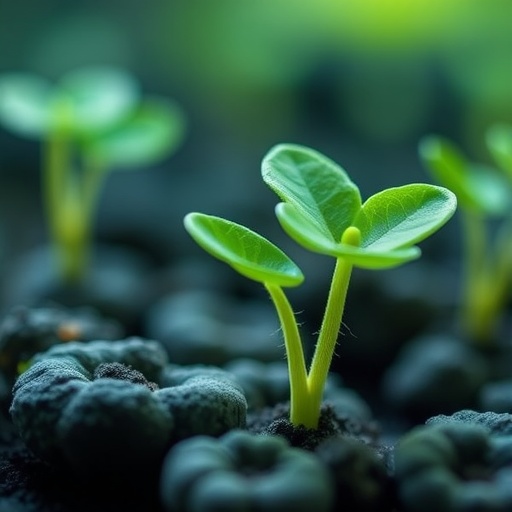In a groundbreaking study published in “Int Microbiol,” researchers have successfully optimized the production of auxins by a specific bacterial strain, Streptomyces californicus CLV91, revealing significant implications for plant growth promotion. Auxins are a class of plant hormones that play essential roles in regulating various aspects of plant development, such as cell elongation, root development, and fruit growth. By enhancing the production of these hormones, researchers offer a novel approach to boost agricultural productivity while potentially minimizing reliance on synthetic fertilizers.
The demand for sustainable agricultural practices continues to rise in the face of global population growth and climate change. Traditional methods of farming have contributed to environmental degradation, leading scientists to seek more eco-friendly alternatives. This new study sheds light on the potential of microbial agents in enhancing plant growth, reducing the need for chemical fertilizers that can lead to soil and water contamination. Through studies of Streptomyces californicus, the team has developed a deeper understanding of how this bacterium can be harnessed to benefit crop yields.
Researchers initially set out to identify bacteria with the capability to produce auxins at significant levels. The findings highlighted Streptomyces californicus CLV91 as a particularly promising candidate. Its ability to synthesize auxins under specific growth conditions was evaluated meticulously, and through optimization of these conditions, the researchers could increase the yield significantly. The results suggested that this bacterium could be a transformative agent in agricultural practices, allowing for more natural crop enhancement strategies.
In evaluating the auxin production, the team employed advanced techniques including High-Performance Liquid Chromatography (HPLC). This analytical method enabled them to accurately measure the concentrations of auxins produced by the bacterium during experimentation. The results indicated that specific nutrients, temperature, and pH levels could lead to increased production efficiencies. These findings align with ongoing research that emphasizes the critical role of microbial activity in soil health and plant growth.
Aside from laboratory settings, the next steps for the researchers involve field trials to assess the practical application of Streptomyces californicus CLV91 in agricultural environments. Implementing this bacterium in real-world scenarios will provide insights into its potential effectiveness across various soil types and climatic conditions. The possibility of integrating natural auxin producers into farming practices could pave the way for increased crop yields while promoting soil sustainability.
The implications of this research are expansive. As global agriculture faces challenges like soil depletion and water scarcity, biological solutions offer a compelling avenue toward sustainable practices. The optimization of auxin production not only enhances our understanding of plant-microbe interactions but also presents farmers with innovative strategies to promote crop resilience and productivity.
Microbial-assisted agriculture could lead to reduced fertilizer costs and lower environmental impact, an appealing prospect for both farmers and consumers. In addition to improving yields, enhancing the natural growth processes through auxins might also bolster plants’ resistance to stressors such as drought and pest infestations. This multifaceted approach could revolutionize the way we understand and manage agricultural ecosystems.
Moreover, the study’s findings add valuable knowledge to the growing field of synthetic biology and microbiome engineering. By tapping into the natural capabilities of bacteria, researchers are making strides toward creating bio-fertilizers that can be tailored to meet specific agricultural needs. The hope is that, in the near future, farmers will be able to use these natural resources to enhance sustainable practices and fight against the backdrop of climate change.
As the team continues to refine their methods and conduct further studies, the excitement surrounding Streptomyces californicus CLV91 grows. The prospect of utilizing such bacteria in agricultural practice leads to discussions about the future of food security, ecological balance, and the advancement of agricultural science as a whole. Stakeholders across the agricultural spectrum await the results of ongoing studies, hopeful that such innovations will soon be available to the farming community.
In summary, the optimization of auxin production by Streptomyces californicus CLV91 holds transformative potential for plant growth promotion. As the agricultural world grapples with the challenges of sustainability and productivity, this research could signal a shift toward more holistic and environmentally friendly farming practices. If researchers can successfully transition their findings from the lab to the field, the reality of sustainable farming may soon become a widely adopted practice.
This study not only contributes to our scientific understanding but also encourages a broader conversation about the role of beneficial microbes in ecosystems. As society looks towards more sustainable agricultural solutions, studies like this will be paramount in shaping the future of food production. The agricultural community stands poised to embrace the insights and innovations that stem from the promising research of auxin-producing bacteria, heralding a new era in sustainable farming.
Subject of Research: Optimization of auxin production by Streptomyces californicus CLV91 for plant growth promotion.
Article Title: Optimization of auxin production by Streptomyces californicus CLV91 for plant growth promotion.
Article References: Franções, M.V., Kenichi Hosaka, G., Ramos, L.M. et al. Optimization of auxin production by Streptomyces californicus CLV91 for plant growth promotion. Int Microbiol (2025). https://doi.org/10.1007/s10123-025-00732-w
Image Credits: AI Generated
DOI: https://doi.org/10.1007/s10123-025-00732-w
Keywords: Auxin, Streptomyces californicus, plant growth promotion, sustainable agriculture, microbial agents, soil health.
Tags: agricultural productivity optimizationBoosting auxin productionclimate change impacts on farmingeco-friendly fertilizersenhancing crop yieldsmicrobial agents for agricultureplant growth promotionplant hormones regulationreducing chemical fertilizerssoil and water contamination preventionStreptomyces californicus CLV91sustainable agricultural practices





